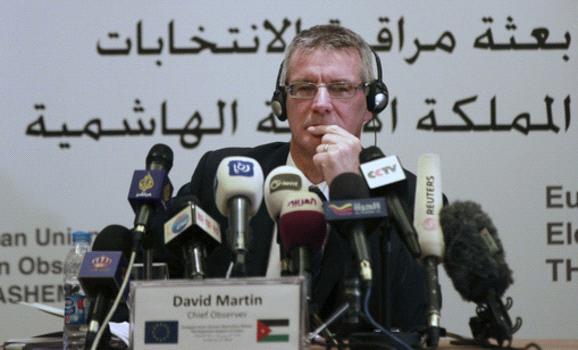Ammon News - By Tamer al-Samadi. Translated from Al-Hayat (Pan Arab)/ Al-Monitor
Political slogans and catch phrases were completely absent from the campaigns and advertising banners of the candidates for Jordan’s parliamentary elections, scheduled for Jan. 23.
For the first time, people chanted slogans away from the world of politics and the Palestinian cause, which has been for a long time a delicate and sensitive matter for voters in a country where half of the population is of Palestinian origin.
Jordanian citizens and political observers derided most of the candidates’ slogans and pledges; this is not to mention the activists who boycotted the entire political process.
Some candidates vowed to turn the kingdom into a Gulf country rich in oil, while others promised to provide more employment opportunities, without addressing the current level of unemployment. One of the candidates from the impoverished areas of the Jordan River Valley promised “to work on reducing the price of fodder and distributing seeds to all farmers for free.”
Observers also noticed that despite the fact that the “Muslim Brotherhood” boycotted the elections, religious banners were raised and some candidates used Quranic verses.
According to some politicians and analysts who spoke to Al-Hayat, these candidates have much in common. They all have modest backgrounds in politics and the majority lack basic levels of education and culture. Rania al-Jabari, an expert in parliamentary affairs, believes that “most campaign slogans are loose and do not reflect clear and specific causes. Many slogans carry great ambitions that are not doable amidst the current economic situation that plagues the country.”
Jabari also said that “there are two types of candidates for the elections. While few candidates are well aware that an imminent change in the citizens’ conditions is not possible, the majority of them wish to come to power by any means possible.”
Moreover, politicians and experts noticed that the Fatah movement has been carrying out intensive activity in the Palestinian-heavy areas, which are considered to be the Brotherhood’s most important strongholds, as most of their residents are of West Jordanian origins. It should be noted that “West Jordanian” is a nickname given to Jordanian citizens of Palestinian origin, who came to the country after the wars of 1948 and 1967. Fatah is seeking to mobilize this large segment of the Jordanian population and urge them to cast their ballots.
Amman has been witnessing for several days mounting controversy following the announcement of an electoral list titled “citizenship.” Reliable political sources informed Al-Hayat that this list has the undeclared support of some of Fatah’s leaders, who live in Jordan and hold Jordanian passports.
While the Palestinian movement denied these allegations, the past few days have seen several leaders affiliated with Fatah joining the list, which enjoyed the support of Palestinian groups within the refugee camps. This is not to mention the meetings and celebrations that were held on the part of prominent leaders within the movement.
The speech given by a senior Fatah commander, in which he expressed his support for the list, aroused the ire of certain political figures affiliated with the so-called East Bankers, or original Jordanian inhabitants.
The controversy erupted following the statements given by Fatah’s secretary-general in Jordan, Najib Qaddoumi, who expressed his support for the “citizenship” electoral list. His speech drew this ire of certain Jordanian dignitaries, who saw it as “an encroachment on Jordan’s sovereignty.”
“I have expressed my moral support for one of the electoral lists in a personal capacity and not as a political leader in the Fatah movement in Jordan,” Qaddoumi said.
Hamada Faraina, a member of the Palestinian National Council and a candidate of the “citizenship” electoral list told Al-Hayat that “our list enjoys considerable support from the [Palestinian] camps’ representatives. The majority of the list’s candidates are of Palestinian origin.”
He added, “It has been claimed that we work under the umbrella of the Fatah movement. Well, this is a great honor for us. However, we do not receive support from any side and my membership in the National Council does not conflict with my sense of nationalism.”
Palestinian refugee camps have long been considered to be the Brotherhood’s “backyard” and their “voting backup.” The Muslim Brotherhood has previously declared its boycott of the elections “as there is no genuine desire for reform.”
* Photo Credit: David Martin, chief observer of European Union Election Observing Mission (EU EOM) to Jordan, listens during a news conference in Amman Dec. 20, 2012. EU EOM's mission to observe the parliamentary election in Jordan, which is scheduled for Jan. 23, 2013. (photo by REUTERS/Muhammad Hamed )










 comment replay
comment replay 